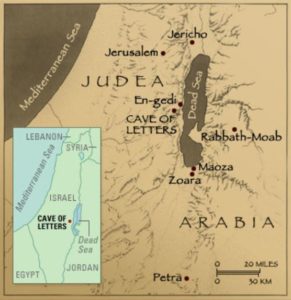A Medieval Jewish Banking Pioneer
 Licoricia (d. 1277) was born to a Jewish family in medieval England. After becoming widowed at a young age and being left with four children to take care of, she survived by working as a moneylender. As women did not have the legal right to be involved with banking at the time, she was able to cut deals using a male attorney. Licoricia grew her business rapidly. By 1242 her reputation was so impressive that she married David of Oxford—then the richest Jew in England—who actually divorced his wife, with permission from King Henry III, in order to marry Licoricia! Unfortunately, her new husband died just two years later and the king used the opportunity to imprison Licoricia in the Tower of London and extract from her a whopping 5000 marks. She paid the fine, and from it 4000 marks were used to rebuild Westminster Abbey. Licoricia returned to Winchester and further expanded her finance business. Aside from King Henry III, her other notable clients were Queen Eleanor of Provence and Simon de Montfort. In 1275, King Edward I prohibited Jews from moneylending. (This didn’t help him: while Jews only charged 2 or 3 percent interest, the Lombards that replaced them charged up to 50 percent!) Two years later, Licoricia was murdered in her home in an unsolved mystery. Licoricia’s son Benedict was the only Jew in medieval European history known to have become a guildsman, allowing him to be an official citizen and permitting him to own real estate. He was ultimately hanged. Her other son Asher was temporarily imprisoned in Winchester Castle, where he inscribed the following message on the wall of his cell that still survives today: “On Friday, eve of the Sabbath in which the [Torah] portion Emor is read, all the Jews of the land of the isle were imprisoned. I, Asher, inscribed this.” In 1290, King Edward expelled all Jews from England, and they would not return until the 1600s, partly thanks to the efforts of Rabbi Menashe ben Israel. Last week, the city of Winchester unveiled a statue of Licoricia, on Jewry Street in front of her historic home. At the base of the statue is the Torah verse to “love your fellow as yourself” in English and Hebrew.
Licoricia (d. 1277) was born to a Jewish family in medieval England. After becoming widowed at a young age and being left with four children to take care of, she survived by working as a moneylender. As women did not have the legal right to be involved with banking at the time, she was able to cut deals using a male attorney. Licoricia grew her business rapidly. By 1242 her reputation was so impressive that she married David of Oxford—then the richest Jew in England—who actually divorced his wife, with permission from King Henry III, in order to marry Licoricia! Unfortunately, her new husband died just two years later and the king used the opportunity to imprison Licoricia in the Tower of London and extract from her a whopping 5000 marks. She paid the fine, and from it 4000 marks were used to rebuild Westminster Abbey. Licoricia returned to Winchester and further expanded her finance business. Aside from King Henry III, her other notable clients were Queen Eleanor of Provence and Simon de Montfort. In 1275, King Edward I prohibited Jews from moneylending. (This didn’t help him: while Jews only charged 2 or 3 percent interest, the Lombards that replaced them charged up to 50 percent!) Two years later, Licoricia was murdered in her home in an unsolved mystery. Licoricia’s son Benedict was the only Jew in medieval European history known to have become a guildsman, allowing him to be an official citizen and permitting him to own real estate. He was ultimately hanged. Her other son Asher was temporarily imprisoned in Winchester Castle, where he inscribed the following message on the wall of his cell that still survives today: “On Friday, eve of the Sabbath in which the [Torah] portion Emor is read, all the Jews of the land of the isle were imprisoned. I, Asher, inscribed this.” In 1290, King Edward expelled all Jews from England, and they would not return until the 1600s, partly thanks to the efforts of Rabbi Menashe ben Israel. Last week, the city of Winchester unveiled a statue of Licoricia, on Jewry Street in front of her historic home. At the base of the statue is the Torah verse to “love your fellow as yourself” in English and Hebrew.
12 Women in History Who Impacted Jewish Scholarship
Words of the Week
The worst offenders are preachers who preach and expound to the masses what they themselves do not understand. Would that they keep silent about what they do not know.
– Rabbi Moshe ben Maimon (1138-1204), “Maimonides”



